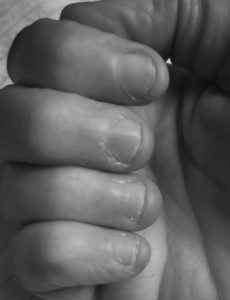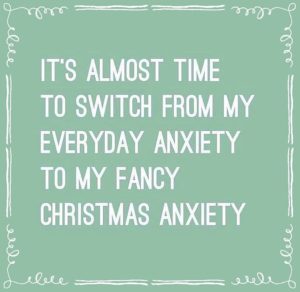I Asked Ten People How They Cope With Their Anxiety, and Here’s What I Found Out…
Anxiety. Where do I begin? I have been planning to write about this subject for the past four months, but I just don’t know where to start. Come to think of it, I’ve had anxiety just thinking about writing this post. What if I say the wrong thing? How do I even begin to cover this topic? It is never ending! Will people think that I am professing to be an expert?
The first thing I want to say is that I’m not any kind of expert on anxiety. I do know that a small amount of anxiety is normal and can even be a good thing. I also know that this can be so severe that it impairs daily functioning. Yes, I work in the mental health field. I know many people that suffer from debilitating anxiety, both at work and in my personal life. I LOVE several people that suffer from debilitating anxiety.
“I Don’t Have Anxiety”
Let’s face it, most of us have some form of anxiety from time to time. I don’t think anyone can truly say they have never suffered from it. Anxiety comes in so many forms. Perhaps you have the symptoms, but just don’t recognize it (or choose not to recognize it). I am the first to admit that I have anxiety in certain situations. Crowded rooms with many people in very close proximity is enough to make me want to crawl out of my skin. If I have to be in this situation, I need to sit in the corner or at least at a far end with my back against a wall. Even at my own home, I often need to give myself a “time out” and recharge my batteries alone in my bedroom, away from everyone else. It isn’t because I’m mad. It isn’t because I hate people. It is something I physically and mentally need to do in order to function.
5 Major Types of Anxiety Disorders
According to http://www.hhs.gov, there are five major types of anxiety disorders:
1. Generalized Anxiety Disorder: Exaggerated worry, even with little or nothing to provoke it.
2. Obsessive-Compulsive Disorder (OCD) : Recurrent unwanted thoughts and/or repetitive behaviors.
3. Panic Disorder: Intense fear with physical symptoms that may include chest pain, heart palpitations, shortness of breath, dizziness, or abdominal distress.
4. Post Traumatic Stress Disorder (PTSD) : Usually develops after traumatic events in which grave physical danger occurred or was threatened.
5. Social Anxiety Disorder : Overwhelming anxiety and self-consciousness in everyday social situations.

What Triggers Your Anxiety?
As I was preparing to write about anxiety, I decided to ask the real experts…those that suffer from anxiety on a regular basis. I asked them what brings on, or “triggers” their anxiety, and what kind of anxiety symptoms they had. The following is a list of the responses, in no particular order. As I read through these, I attempted to categorize in my mind what kind of anxiety each one represented and if these were normal everyday anxieties or debilitating anxieties. I’ll let you do the same.
Triggers
- “I feel as though I need to run away from certain situations”
- Crowds (this was the most common)
- Long lines in stores
- Any type of social gatherings, no matter how small.
- Meeting strangers for the first time
- Speaking in front of people
- Leaving the house.
- Traffic issues (driving in unfamiliar places, driving in the dark)
- Last minute changes
- Getting singled out in front of others (birthday celebrations, etc)
- Doing the wrong thing, angering people
- FEAR (in general)
- Fears/racing thoughts ( not “fitting in”, not “measuring up”, poor health, children’s issues, finances, world in general)
- Overwhelmed at work or school
- Social media
- Holidays

Symptoms
- Hair standing on end
- Heart racing or pounding (feels like a heart attack)
- Shortness of breath
- Dizziness
- Urgent need to “get out of there”
- Flushed face
- Can’t speak
- Rapid speech
- Choking Sensation
- Feel like everybody is looking at me
- Constant leg shaking (or other body movements)
How Do You Ease the Anxiety Symptoms?
I now posed the question about ways that my experts found helpful to ease their anxiety. Again, I got several great suggestions.
- Hot baths
- Breathing techniques (specifically deep breathing)
- Sitting in the sun
- Bird watching
- Prayer
- Long drives in the country
- Listening to music
- Earbuds
- Watching television or other distraction
- “Breethe” app or other guided meditations (yes, this is the way it is spelled)
- Positive self talk
- Positive affirmation cards
- Cry or yell
- Coloring or drawing
- Journaling
- Reading
- Hiding or getting away from everything and everyone
- Exercise
- Talking to a friend or family member
- Touch each finger to thumb, one at a time
- Rub earlobes
- Citrus essential oil. Place a drop in hand, rub, and inhale deeply.
- Other essential oils (I will soon be trying a “calm roller” with 5 oils in it..update to come)
- Sleep
There were other coping strategies that were mentioned such as the use of alcohol or other non-prescription substances to numb the effects, smoking, nail biting (one of mine, sadly), pulling hair, and self-harm. Of course, these are not recommended but I felt I should include them as part of the “big picture”.

5 Step Grounding Technique
This is a technique that works very well for many people when they begin to experience severe anxiety symptoms. Sit in a quiet place, and concentrate on the present while observing the following:
5 THINGS YOU CAN SEE AT THIS MOMENT
4 THINGS YOU CAN FEEL AT THIS MOMENT (EX: YOUR CHAIR, YOUR FINGERTIPS, THE FABRIC OF YOUR CLOTHING, ETC)
3 THINGS YOU CAN HEAR AT THIS MOMENT
2 THINGS YOU CAN SMELL AT THIS MOMENT
1 THING YOU CAN TASTE AT THIS MOMENT ( OR THINK OF 1 THING YOU LIKE ABOUT YOURSELF)
Grounding truly helps to halt racing thoughts and bring a person back to the here and now.
As I said, I have loved ones with severe anxiety. One of my loved ones used to suffer from frequent panic attacks, which felt to them like the exact symptoms of a heart attack. Once we learned what was going on, my loved one would call me with the onset of an attack. I would remind them that anxiety is sneaky and can manifest itself physically. I would “talk them down” from the attack by reminding them it is a vicious circle. The emotional anxiety brings on the physical symptoms, and the more upset one gets at the symptoms..the worse the anxiety becomes, which causes the physical symptoms to increase..and on and on. Reminding them to take deep breaths and remember that this is anxiety and it will pass helped to ease those physical symptoms as well.
Again, I’m not an expert, but hopefully some of these suggestions will help just a bit. Anxiety is REAL , hard to live with, and nothing to be ashamed of having. Thank you to everybody that shared your stories with me. I welcome and encourage any comments with other stories or suggestions. 🙂

